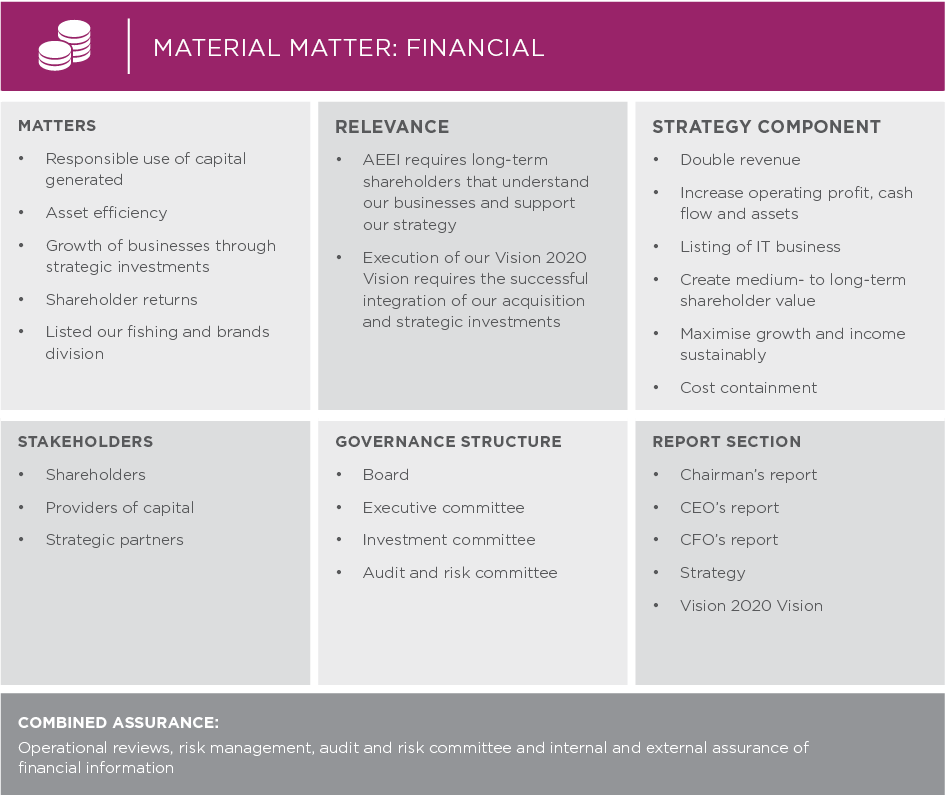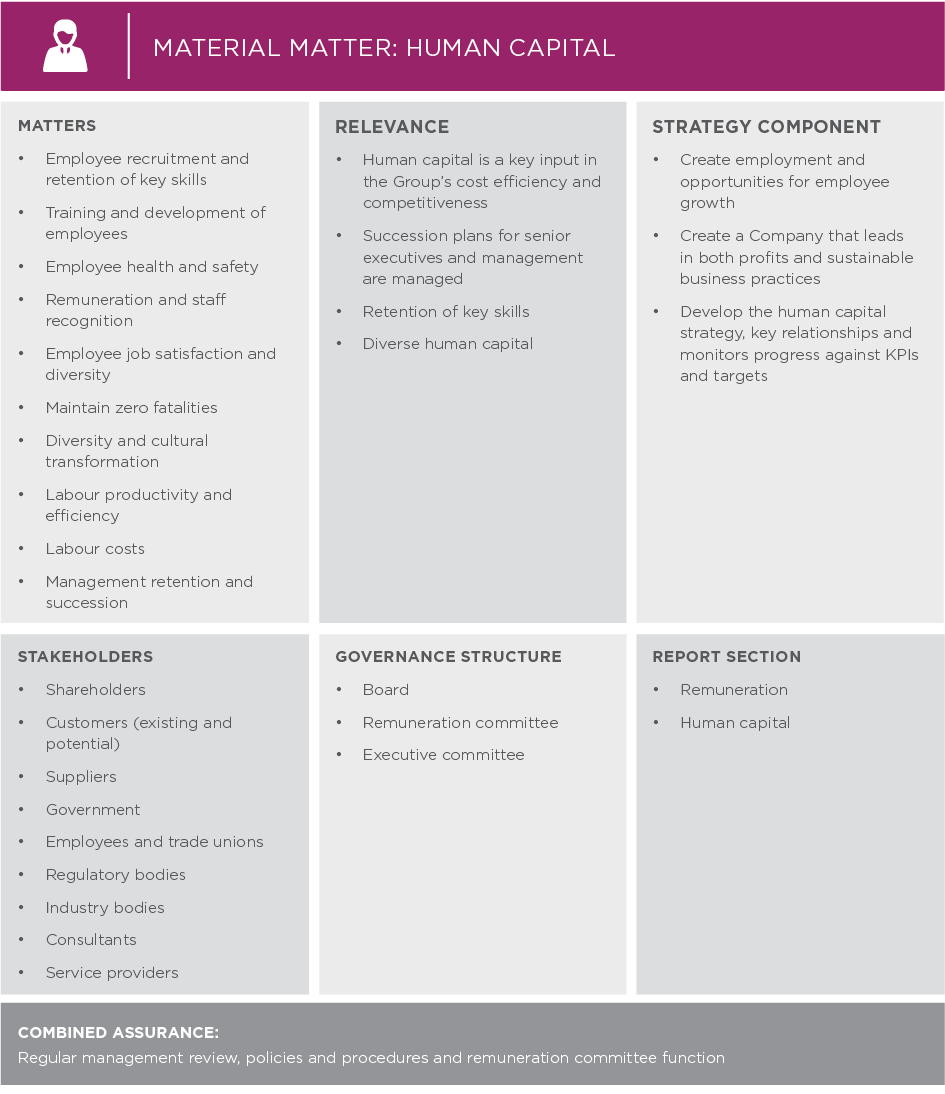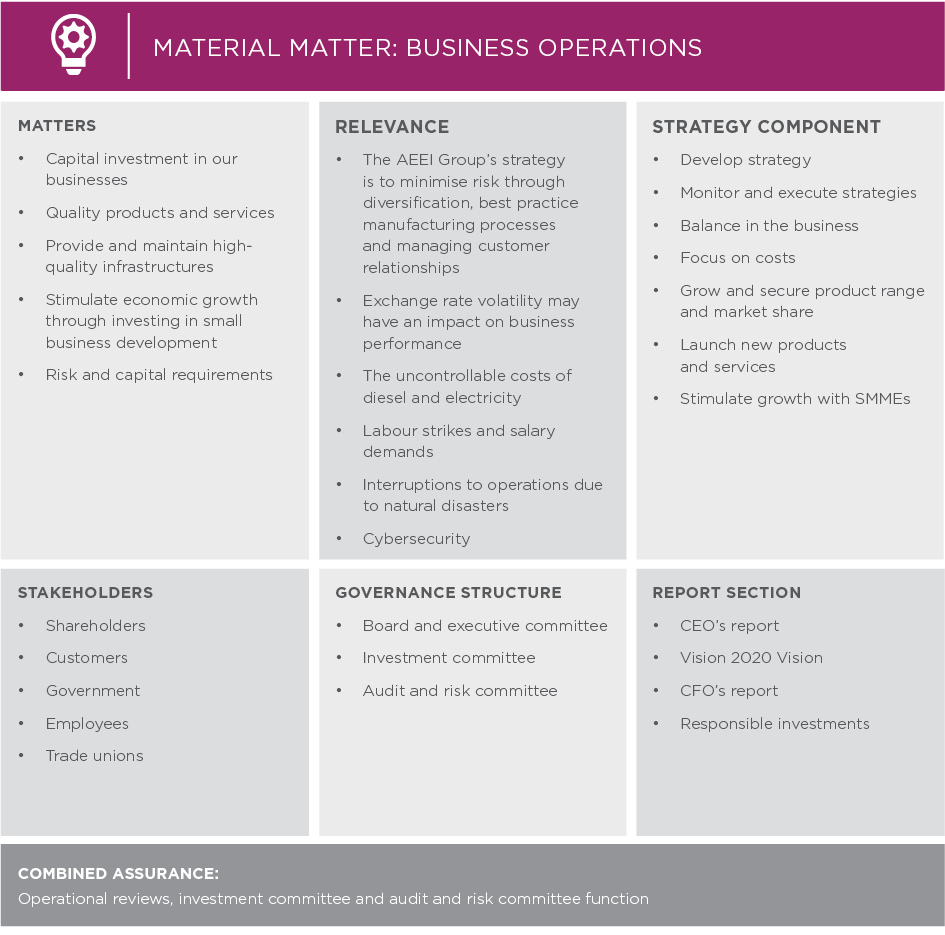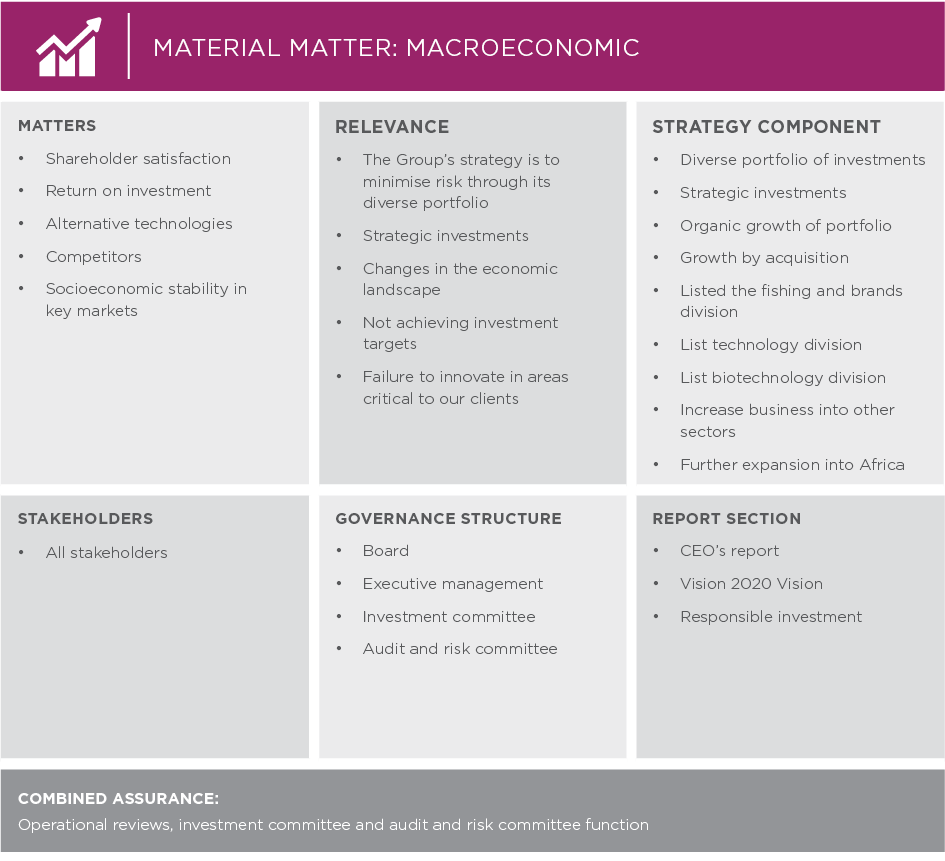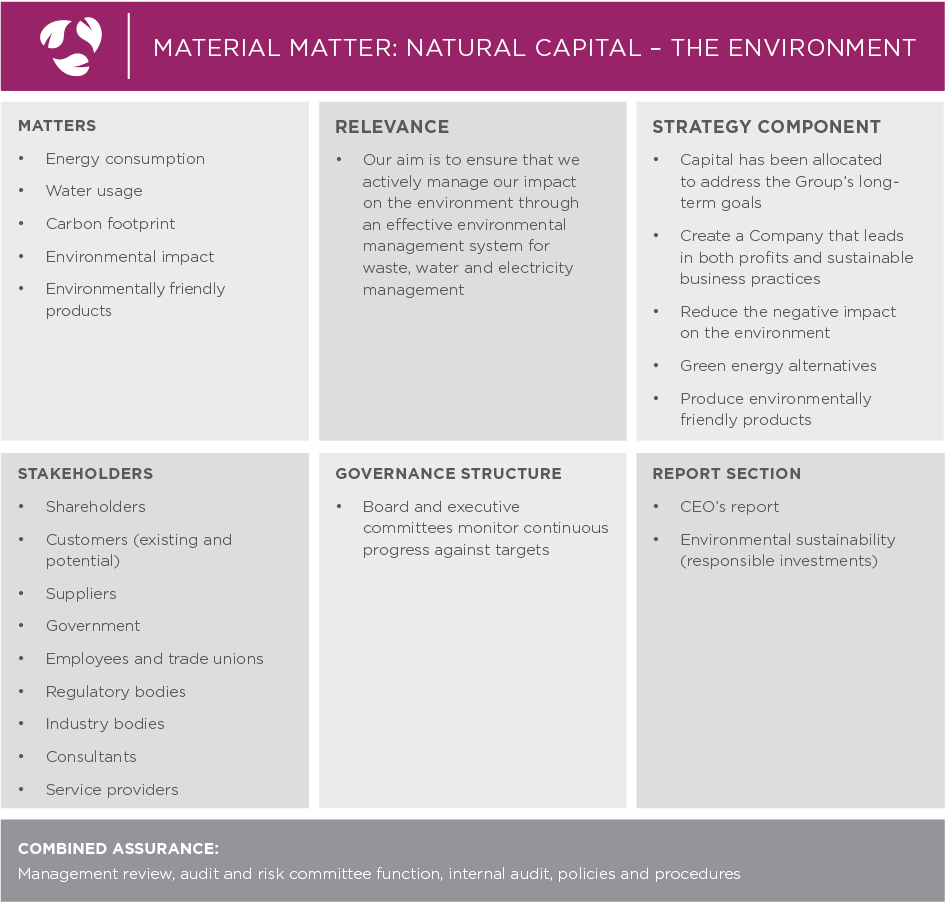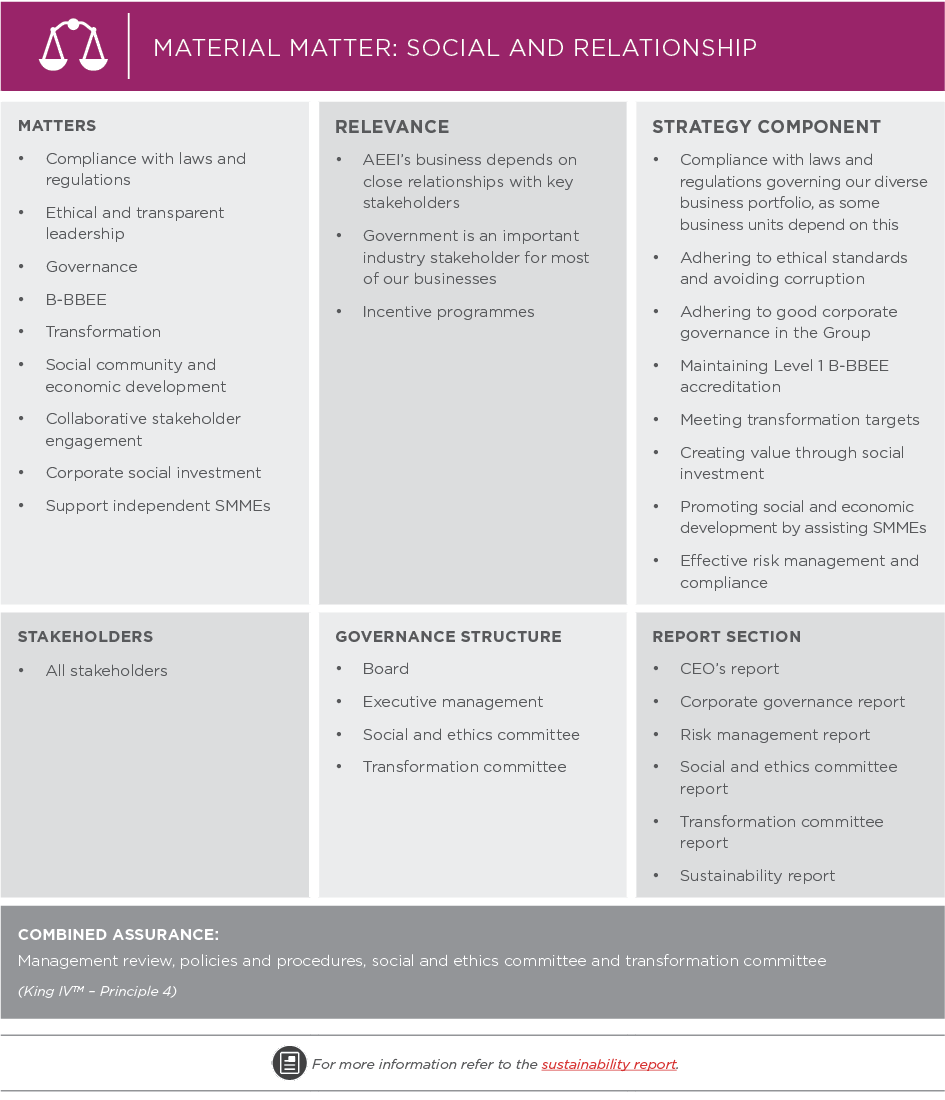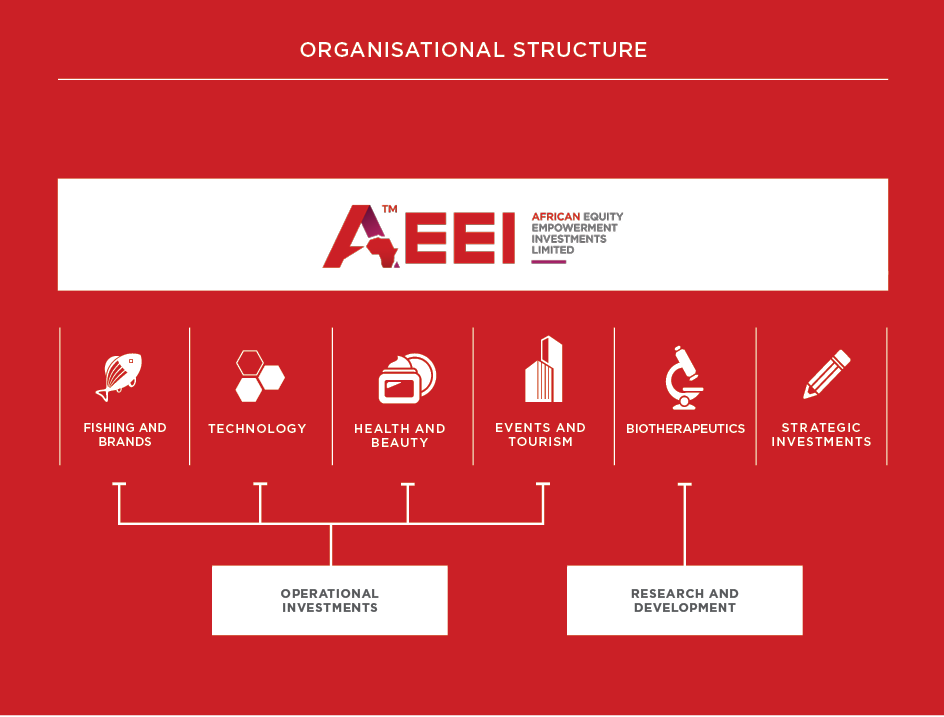
BUSINESS MODEL AND STRATEGIC GROWTH OBJECTIVES
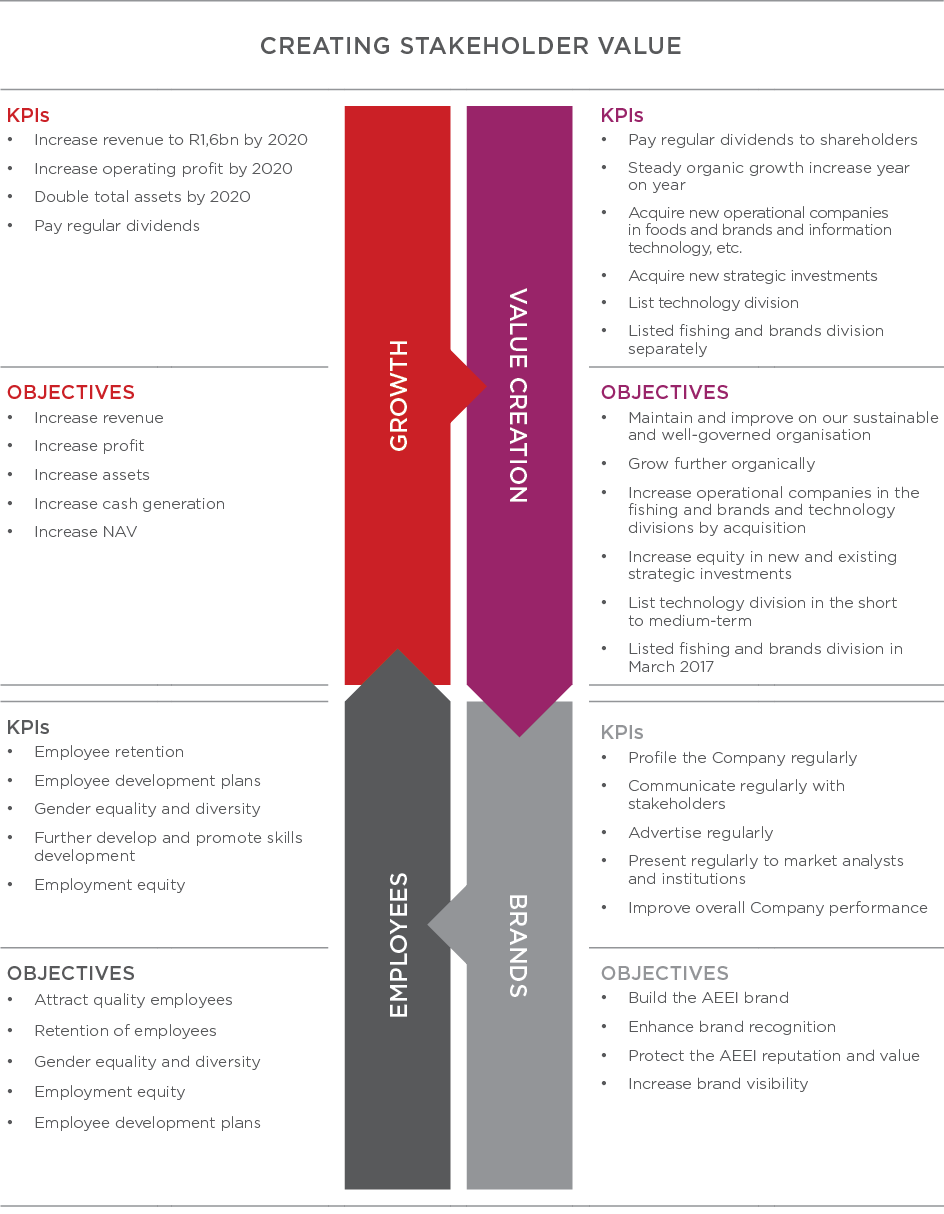
OUR STRATEGY to 2017 AND progress made in terms of our VISION 2020 VISION
AEEI’s business model, investment approach and philosophy resulted in it acquiring control of the majority of its operational investments as well as holding minority equity in strategic investments. This enables it to add value through its extensive expertise and networks, while promoting an entrepreneurial culture within its management structure and staff. Through our assets and investments, we drive the businesses to become efficient on a sustainable basis, which generates revenue, dividends and cash flow to support the Group as a whole.
“Vision without action is merely a dream. Action without vision just passes the time. Vision with action can change the world.”
Joel A Barker
One of AEEI’s key strategic objectives is to create sustainable value for all its stakeholders and to integrate sustainable development into strategy, governance, management and reporting, with the objective of reducing the negative impact on the environment.
AEEI’s financial strategy is to grow through acquisitions and leveraging the existing portfolio by maximising the net investment asset base and improving cash generation, thereby growing income sustainably and managing its costs.
Through the Company’s achievement of economic growth and its social contract, it remains one of the few Company’s to have consistently topped the rankings in its sectors overall over the last few years and is placed as the number one empowerment Company in South Africa.
As a result of AEEI being recognised for its leadership qualities in the transformation of society and its innovative business model in South Africa, the Company continues to be invited to participate in a number of global forums and multilateral organisations.
AEEI’s strategic approach to risk is to regularly assess whether the risk process is effective in identifying and evaluating risks and to determine whether the business operations have managed the risks in line with the Group’s strategy while considering mitigation action and the overall sustainability of the business.
The Group’s businesses are on track to deliver on its growth plans and goals towards achieving its Vision 2020 Vision strategic planning for the 2020 financial year.
The Board of directors delegated the action plans to the Group’s executive management for implementation with clear deliverables. The Group’s executives provide feedback at the quarterly Board meetings on progress made.
The following high-level KPIs are ongoing:
- Double revenue
- Increase operating profit substantially
- Increase operational cash flow significantly
- Increase NAV significantly
- Substantially increase or double total assets
- Separate listing of the IT business
- Regular payment of dividends to shareholders
- Create medium- to long-term shareholder value
- Develop positive director and stakeholder involvement in the strategy
- Building the AEEI brand
- Create employment and opportunities for employee growth
- Create a Group that leads in both profits and sustainable business practices.
Listed below are the Group’s 2017 achievements:
- Group revenue grew to R1 052m from R736m
- Group profit before tax grew to R681m from R288m
- Cash generated from operations increased from R75m to R79m
- Group NAV increased from R1bn to R2bn
- Group assets grew to R2.8bn from R1,7bn
- Listed the fishing and brands division in March 2017
- Increased equity stake in one of our strategic investments
- A significant reduction in debt to equity
- Solid cash management
- Payment of dividends and interim dividend
- Purchased 90% stake in a cosmetics company
- Acquired 51% and 57% stakes respectively in two technology companies
- Provided a safe and healthy workplace and strived to reduce the environmental footprint of products and operations and supported local communities
- Engaged with and further developed diverse suppliers and enterprise development clients
- Strengthened management systems that govern responsible operations
- Pursued partnerships with key stakeholders and formed joint venture initiatives to promote localisation
- Further identified opportunities for local manufacture and the promotion of skills transfer
- Fostered equality within our work environment irrespective of gender, race, creed and other forms of diversity
- Developed personal plans for employees and promoted performance management
- Further promoted skills development and learnership programmes
- Continued to build leadership capacity among women
- Engaged with our staff at all levels, which provided us with the necessary feedback and input in understanding and responding to improving their skills and training needs
- Adoption of King IVTM
- Ensured full compliance with the changing regulatory requirements
AEEI continues to support the development of a positive public attitude towards increased innovation, the stimulation of new green enterprises, upskilling new and existing employees and managers, investing in research and development and developing research centres relevant to our industry and intellectual property.
OUR COMMON VISION AND COMMON OBJECTIVES
OUR SHARED VALUES
What shared value means to us: Understanding stakeholder expectations and societal needs and communicating through stakeholder engagements.
WE ARE DRIVEN BY OUR VALUES
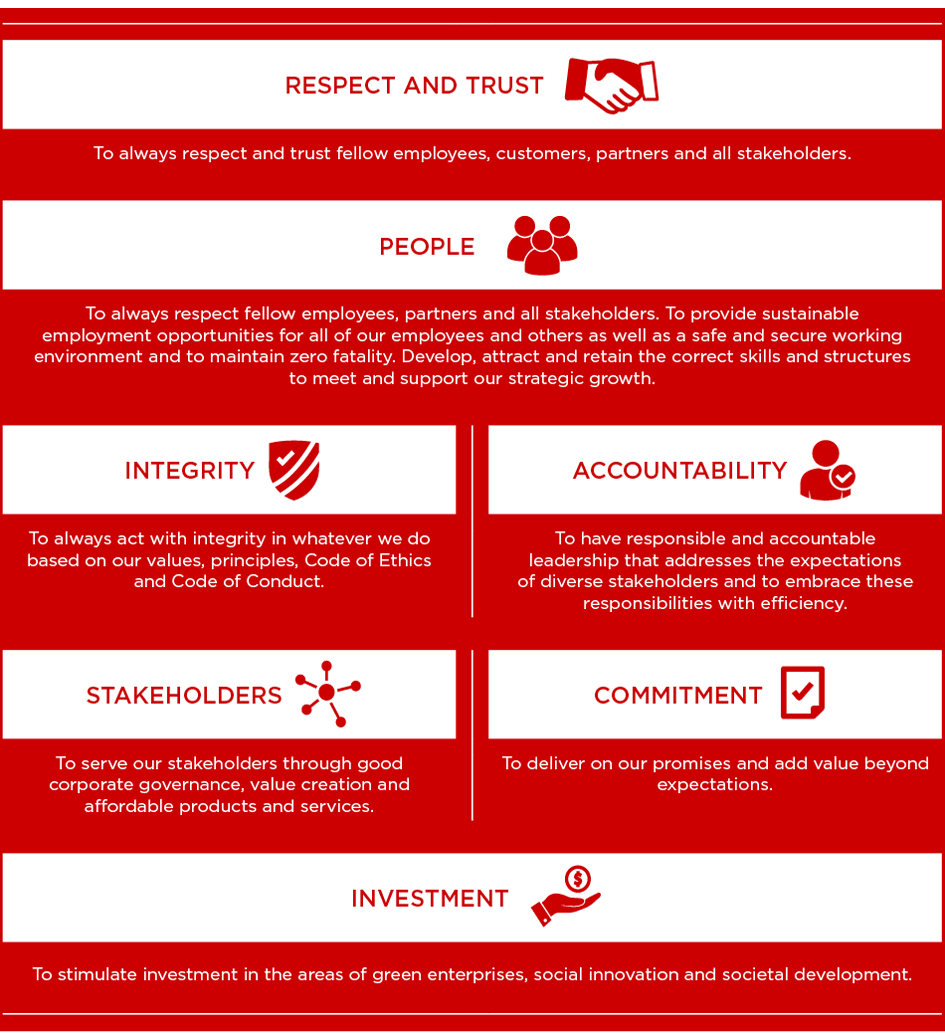
OUR COMMON OBJECTIVES
To sustain profitability by partnering with communities and government in a social contract to achieve economic growth and giving more South Africans access to this growing prosperity.
OUR COMMON GOAL
To ensure that the Group delivers long-term value to all its stakeholders; increases shareholder wealth, economic transformation and the development and upliftment of social communities; and builds long-term stakeholder relationships.
OUR INTEGRATED VALUE CHAIN
The Group looked at innovative ways to sustain its existing businesses by adapting to changing environments and through our acquisition and new business development approaches. With our risk management approach and the impact of changing markets, competitors and the economic environment, management is constantly aware of how the Group can improve sustainability through constant change.
VALUE CREATION USING SIX CAPITALS
When making decisions on how to manage and grow our businesses, AEEI takes into account the six capitals, including the resources required. These are critical to AEEI’s ability to create value. AEEI uses the input of each capital for the effective production and delivery of services and goods, thereby creating value for our stakeholders.
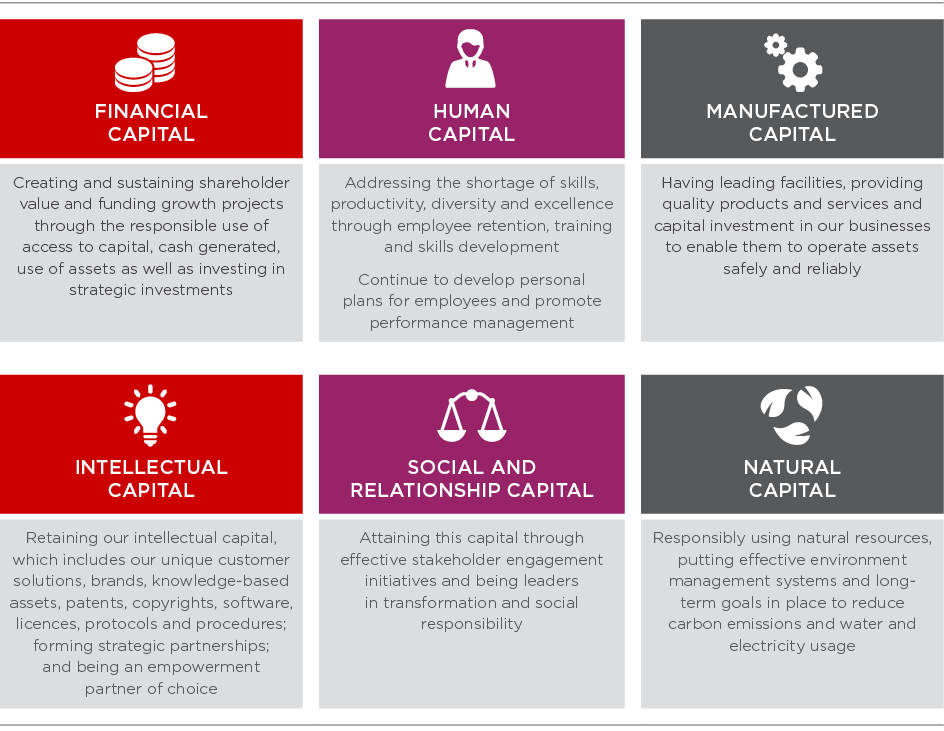
Outcomes for our stakeholders
The Board and executive management → evaluated risks → assessed the impact on our material matters → and evaluated the impact on our strategic priorities.
OUR INTEGRATED REPORTING MODEL
AEEI’s strategy is to create sustainable value for all shareholders and stakeholders and to ensure that the Company remains attractive to investors by optimising shareholder returns. AEEI’s sustainable value creation goes beyond short-term profitability and takes into account the broader economic, social and environmental factors.
Our approach to addressing these matters is to prioritise those most important to achieve medium- to long-term sustainable businesses.
We have identified strategic enablers in order for us to execute our business model and achieve sustainable value creation. (King IVTM – Principle 4)
SOUND GOVERNANCE
We can only be a sustainable business if we deliver on our promise by promoting good corporate governance, which is an integral part of our business model that is built on delivering good governance outcomes in terms of an ethical culture, effective control, good performance and legitimacy. Our sound governance platform is embedded in our corporate culture.
(King IVTM – Principle 6)
DEVELOPMENT OF PEOPLE
Together with financial capital, our employees are our single most important resource. It is important for AEEI to attract and retain the right calibre of people, to keep them motivated in a safe, supportive working environment and remunerate them accordingly. In doing so, AEEI continued with training and development during the year and ensured that employee development plans are in place for the retention of employees.
The AEEI Group continued to instil a culture of excellence and opportunity for all employees. (King IVTM – Principle 14)
SOCIETY
In order to remain sustainable as a business, we contributed towards social and economic development and developing partnerships that enhanced our long-term viability in a stable and growing economy.
In order to create an enabling environment and develop and enhance markets for our products, we were proactive and responsive to our stakeholders’ interests and ensured that we implemented best practices when it came to responsible investing. Our aim is to invest in businesses that have a sustainable approach to doing business. (King IVTM – Principle 3)
ENVIRONMENT
AEEI and its various business units in which it operates are not considered to make a particularly heavy demand on the natural environment. However, businesses in the AEEI Group are committed to being industry leaders and added value to the services they provided by implementing sustainable business practices that minimise the impact that their operations have on the environment. Environmental commitments are an integral part of their day-to-day activities.
AEEI has a very low direct impact on the environment, but we are affected by the environment in which we operate and by the effect that climate change in general has on our business. We commit our businesses to a journey of responsible environment stewardship. We acknowledge that a stable economy and a sustainable business require a sustainable environment. Our fishing and brands division works closely with the relevant authorities to safeguard various fish species and pays careful attention to the environmental impact of its operations. (King IVTM – Principle 3)
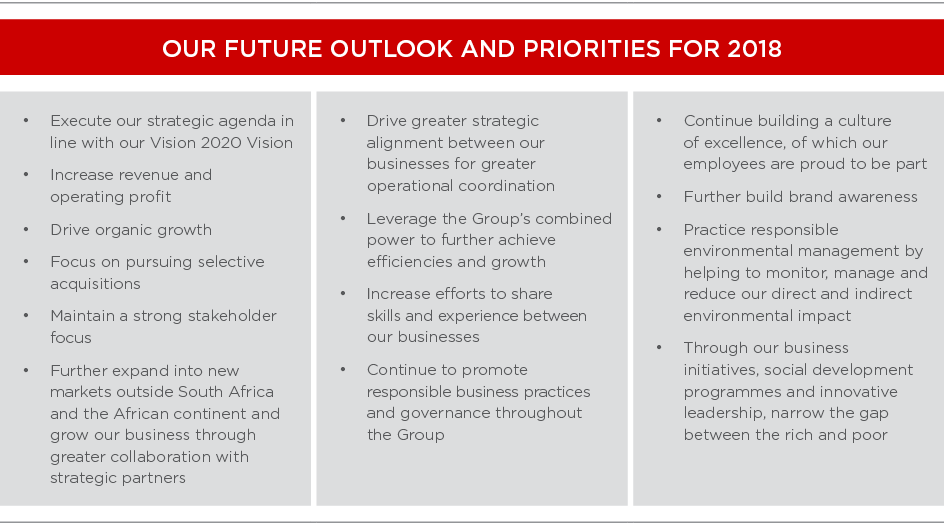
OUR KEY STAKEHOLDER ENGAGEMENT AND RELATIONS
AEEI places great value on the high standards of ethics, communication, transparency of information in terms of the Promotion of Access to Information Act, 2000 (No. 2 of 2000) (Promotion of Access to Information Act), regulatory and other directives relating to the dissemination of information.
The Company has identified stakeholder groups with whom it engages in a structured manner. Refer to key stakeholders for full details.
AEEI appreciates the role of its stakeholders and remains committed to nurturing impactful relationships that deliver mutual benefits and encourage transparent, objective and relevant communication. The Group recognises that its businesses are one of the stakeholders in the socioeconomic and environmental system. It is essential for the Group to compete successfully in an increasingly complex and ever-changing business environment and to systematically bring about the change needed for sustainable development. We built and maintained trust and respect with our various stakeholders, thus ensuring a positive impact on our reputation.
We addressed essential risks and opportunities and responded timeously and appropriately to issues raised in our interactions with our various stakeholders. (King IVTM – Principle 16)
OUR VALUE ADD
A measure of the value created by the Group is the amount of value added by its diverse activities to the cost of raw materials, products and services purchased. Refer to our value-added statement for full details.
MATERIALITY ASPECTS AND OUR RESPONSE TO STAKEHOLDERS’ INTEREST
OUR MATERIAL ISSUES
The AEEI Group focused its reporting on sustainable development and those directly affecting the Group’s ability to create value, as well as the Group’s impacts and responses to the expectations of its stakeholders.
AEEI’s material matters are those challenges and opportunities that could substantively affect the Group’s ability to create value over the short, medium and long-term sustainably or impact our stakeholders.
We identified our material matters in terms of relevance from the risk assessment process. This process includes uncertain events with a potential negative effect on the Group i.e. opportunities not being captured or not materialising. It also takes into account the legitimate and reasonable needs, interests and expectations of all material stakeholders in the execution of the Board’s governance role and responsibilities and in the best interests of the Group.
DEFINING OUR MATERIAL THEMES
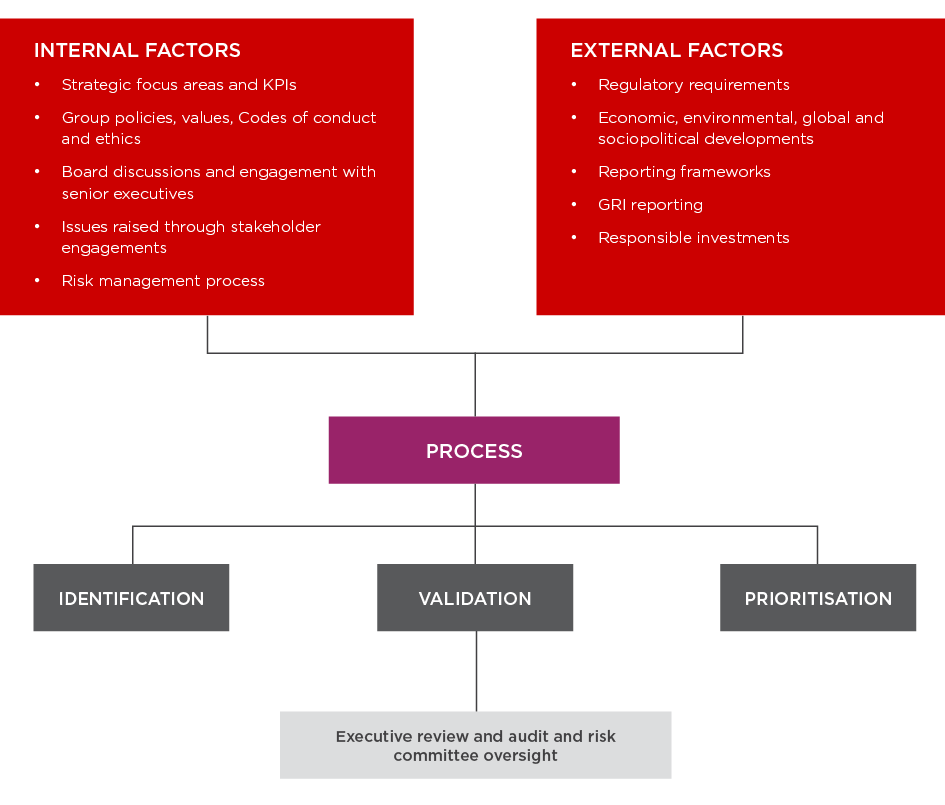
Through a formal process by each Board committee including executives in the Group, material matters were identified in terms of relevance. These material matters were approved by the AEEI Board. The process takes into account the issues raised, their relevance, our strategic component, the stakeholders, our governance structure and where further information can be found in the integrated report.
The following material matters were identified:
